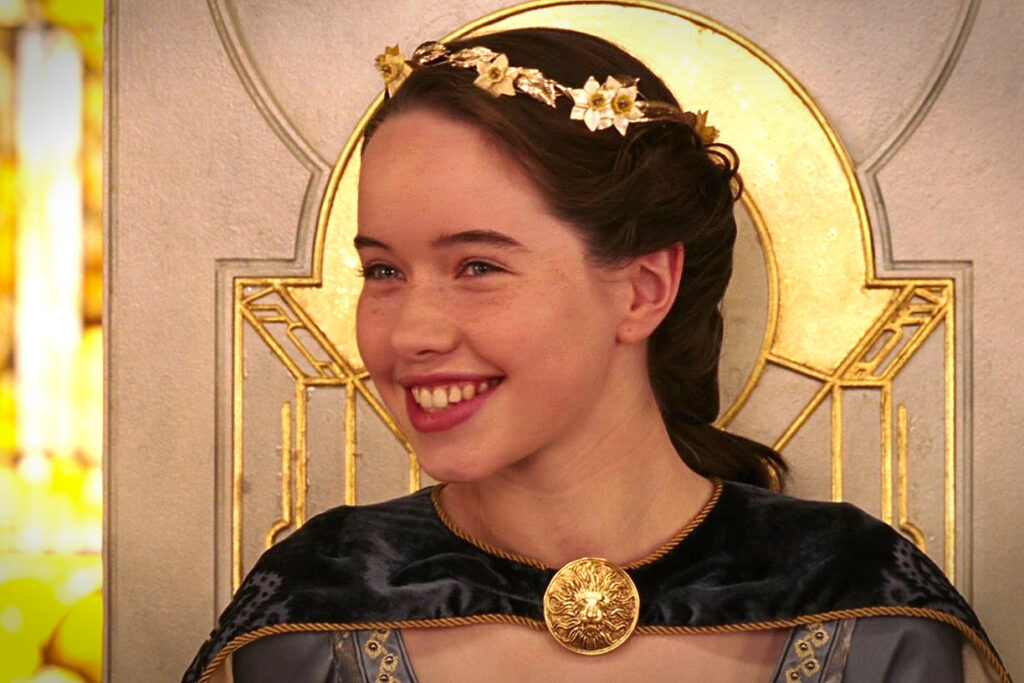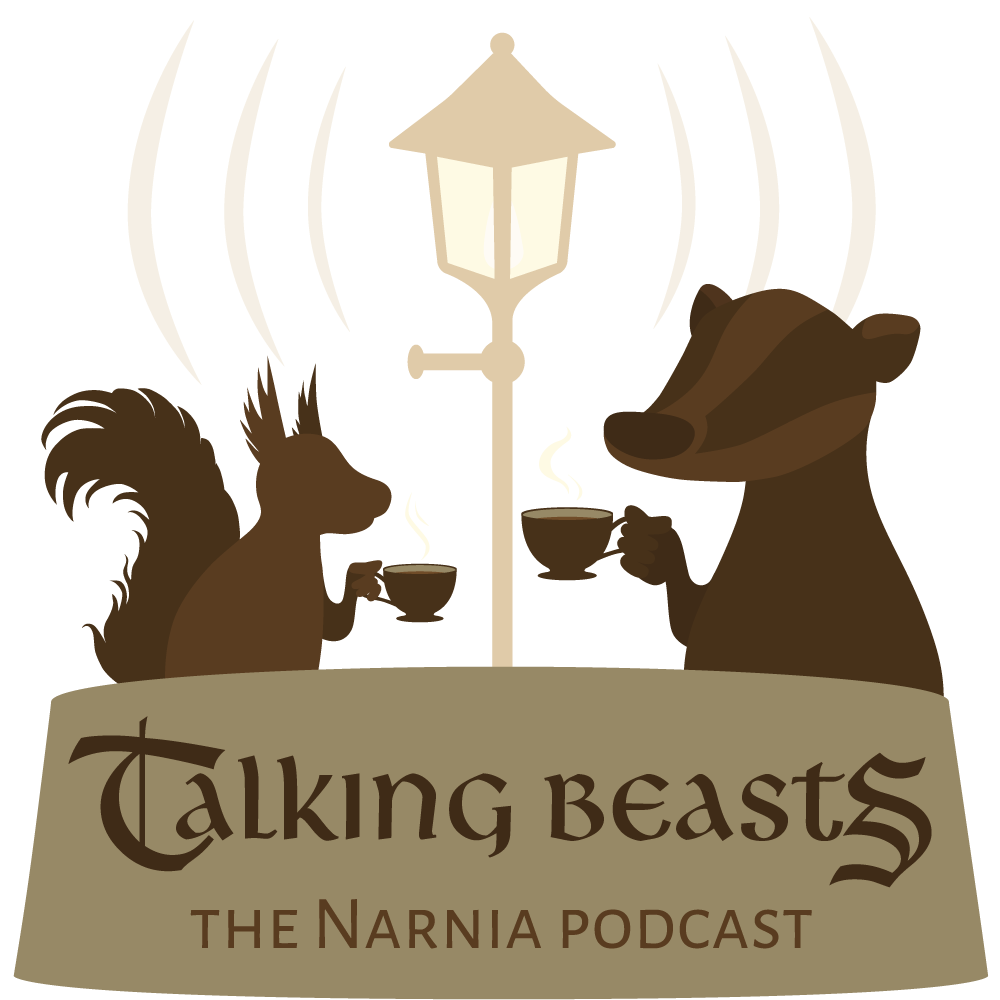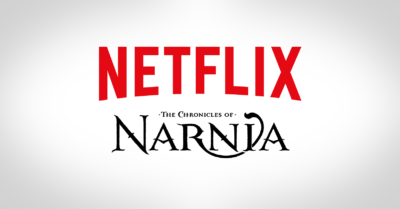Return of the Pevensies | Talking Beasts
The Horse and His Boy Book Commentary, Part 3
Podcast Discussion

Don’t get me wrong. I love exploring new lands and meeting new characters. But The unexpected appearance of Queen Susan and King Edmund (and even Mr. Tumnus) in The Horse and His Boy feels like coming home.
And then C.S. Lewis follows that up with perhaps the creepiest scene in The Chronicles of Narnia.
But first things first: Your comments. There was that poll in the Facebook group that led to some heated discussion… I’ll dare to attempt an explanation. Thanks for posting, everyone. Keep ’em coming.
– Glumpuddle
Think you can stump a NarniaWebber? Send trivia questions to podcast[at]narniaweb.com with “Stump” as the subject.
Voices of NarniaWeb: Send your 1-3 minute audio file to podcast[at]narniaweb.com with “Voice” as the subject. Suggested talking points:
- Begin with your name/alias and location (country or state will suffice)
- How you discovered Narnia, first impressions
- Favorite book, character, scene
- Anything else you’d like to say about Narnia, what it means to you, your reactions to the movies, etc.
The C.S. Lewis Minute is brought to you by William O’Flaherty from EssentialCSLewis.com.
Be a talking beast! Post a comment below or in the Facebook group.
Podcast: Play in new window | Embed






Is the next podcast going to discuss the scene with the Tisroc, Ahoshta and Rabadash? I'd love to hear the podcasters' opinion on a question. Does the tisroc (may he live forever) really believe Ahoshta's flattery? The tisroc seems like a pretty sharp guy. He can tell that attacking the Narnians is probably going to fail. He can tell that Ahoshta doesn't like Rabadash. He can tell that Rabadash probably doesn't really like his father. So does he really believe Ahoshta's claims about how much he loves the tisroc? And if not, why does he keep him around?
As far as pets go, dogs bite you when they dislike you, lick you when they like you (yuck!) and jump on you in any case. I'd say cats win by default. Plus people seem to dislike cats because they're unsocial and I am also unsocial (or used to be anyway) so that makes me feel like we have a bond between us.
That's an interesting idea that Shasta would have been more like Corin if he hadn't been separated from his family. I think that while there may be some truth in it, Shasta and Corin would still have been very different even if they'd grown up together. People aren't just blank slates after all.
In Corin's defense, he would have had some time to grow up before he became king, so I don't think Narnia would have been in too much trouble. But given the ages of the Pevensies, Caspian, and even Tirian, he's definitely much less mature than those who became rulers around that age. Yay for the providence of Aslan in providing a better king!
Thanks for using my submission! A soundtrack that reminds me of HHB is the one Harry Gregson-Williams did for "Prince of Persia." I haven't seen it, but when I stumbled across the soundtrack it just sounded like Narnia due to having the same composer. I can't wait for your discussion of the Palace scene. It's so well-written, hilarious and creepy.
That's a really good point about Lewis not talking down to the reader. That's one of the things I like most about Lewis' writing, whether it be his fiction or non-fiction. He was vary good getting on the readers level.
Great question. I would tend to think he doesn't really believe Ahoshta is being sincere, but takes pride in the fact that Ahoshta is forced to pretend because of his lower position.
We've already recorded the next episode, but maybe we can explore your question more at the beginning of the following episode. Thanks!
I agree with you Glumpuddle, I don’t want the Pevensies in the poster if HHB gets made into a movie, I would like it to be a suprise for anyone who hasn’t read the book.
I think you’re right, they might have the same actor to play both the twins. When the HHB play comes out in the logo’s theatre, they might be lucky and find twin actors to play Shasta and Corin, I watched a play that came out several years ago and the actor who played Corin does not look exactly like the actor who played Shasta.
I'm not sure if I ever thought about the fact that Lewis had immersed us so much into Shasta's life and his view on things that he kept it up even though we, as his readers, had already met Susan, Edmond, and Tumnus.
I'm not sure if I ever thought about the fact that Lewis had immersed us so much into Shasta's life and his view on things that he kept it up even though we, as his readers, had already met Susan, Edmond, and Tumnus.
And, yes, it doe help to have your back against something you trust. 🙂 Loved it!
(I didn't mean to send this one. My computer is acting up.)
And thank you for your kind words on Voices of NarniaWeb! They are appreciated. 🙂
If this were the Walden Media franchise, I'd be worried about that. But it's a totally new series and the Pevensies don't even exist in it or if they do they aren't characters we're familiar with and therefore not a box office draw.
Now you mention cats, I have one that jumps on me, especially first thing of a morning. That cat tells me to rise and shine. And is likely to herd me to his food bowl. The good thing about cats is their ability to communicate, and to comfort someone in distress.
Maybe Shasta might have been more like Corin if he had not been kidnapped. But then, what about the denouement of Horse and His Boy?
As to how much the twins resembled each other, even if they were born identical, wouldn't their personalities have still varied over time depending on what experiences they have? The point about Shasta's upbringing is that he is forced into a lowly position where he has to think about what he is doing and isn't allowed to be as carefree as Corin. I'd imagine that whilst the resemblance between Shasta and Corin is marked, physically, I'd also imagine that when they were both washed, that Shasta would be somewhat more tanned than would be Corin, for climatic and occupational reasons. Working continually outdoors in a warm climate, on fishing nets, for example, would be much different to Corin being educated, even if it involved outdoor activities such as horseriding.
Probably my favorite line in the whole book is the one where Shasta tells Corin to tell the truth and Corin replies with "what else did you think I would tell them?" I'm probably not quoting that right, but that line says a TON! It didn't even cross Prince Corin's mind that he would tell anything else but the truth. Mind you, he's a very strong willed boy, does what he sets his mind to, and also he wasn't the one who would be in trouble if the Pevensies found out about Shasta's identity. Still, that says a lot about a person's character, that they would never consider hiding the truth or tell a lie. That line has always stood out to me. I would hope that, when I'm in a really tight spot, I would be willing to be the same way; even if my neck were on the line.
Thank you for mentioning my point at the beginning of this episode, that Tashbaan could be just about any overcrowded, politically important, international city. Although several people have commented about the Middle Eastern feel of the Horse and his boy, I'd really love to see preserved more the cross-roads of humanity aspect of Tashbaan, itself, if not all of Calormen, so as to ensure that it is not made specifically Arabic in any way. Thus, down south in Calormen you might see a lot of people who are similarly dressed to Arsheesh and Anradin, but the further north Shasta and Aravis goes on their journey to Tashbaan, the more people might vary in style of dress, at any rate. Shasta's ragged clothes, sunburn and general dirtiness would ensure that he would still pass unremarked as a local in Tashbaan, even though Edmund is looking for someone who resembles Corin. One thing which is a Tashbaan landmark, is the conspicuousness of the Great Temple, with the Tisroc's palace beside it, which is very similar to the Aya Sophia next door to the Topkapi Palace which overlook in a line the Golden Horn as one sails to the city. That city crosses Europe on one side and on the other is part of Asia Minor, the jutting out bit above what is considered "the Middle East". And some of the European styles of dressing in about 1453 AD were not so different from the Asiatic/Turkish styles C.S.Lewis describes as Calormene wear, in particular the pointy toed shoes and slippers (My daughter bought a pair near the Chora Museum). That style of shoe, in an even more exaggerated form were all the fashion in Western Europe in the late Middle Ages, at time when men still could wear long robes, or at least to mid-calf .
This episode of Talking Beasts is entitled, the "Return of the Pevensies", and I agree that their return is a surprise which should be kept that way. But we only see two of the Pevensies at first, that is, Susan and Edmund. What do we learn about both characters in this scene in particular, in this book, especially Susan, and how does it tie in with what we learn about them in other books in which she appears?
The difference between Shasta and Corin is the difference between nature and nurture. Shasta has gotten into trouble for the least little thing, and knows that it is better not to say anything at all if he can't tell the truth. Whereas Corin only gets a scolding for going missing. Actually it isn't Corin who gets the scolding, poor Shasta got that scolding as well as the blow from the soldier for being a cheeky street slave.
What you said was perfect. You described narniaweb incredibly. Great job!
You asked for parents insight in the middle of your podcast. I have three pretty young children. And by no means am I a perfect parent, I do many things wrong. However talking down to them or belittling an issue they maybe having is something my wife and I focus really hard not to do. Talking down to your child does nothing positive. Our job as parents is to make these little humans into smart, moral, strong, and independent big humans. I am a firm believer in imagination. Talking down or making them feel less destroys imagination. Even when they are scared of the dark. Telling them that they shouldnt be scared of the dark in a demeaning way rips away part of that imagination. We need to teach them how to control it. Now, I dont mean let them continue to think that there are monsters under their bed, but letting them be afraid and then showing that there is nothing to be afraid of is beneficial. We have to remind ourselves, they are growing from little people to big people. What issues they have right now for them is the biggest thing in the world. Walking them through it and not pushing it to the side is important. So yes, Glumpuddle, what you said you want to do when you finally have kids is awesome. Get on their level. Encourage the imagination, dont rip it away from them. That happens eventually, I dont want to be the cause. Bottom line…encourage the imagination. Listen on their level, and dont brush aside issues you may think are small. Letting them learn and figure it out while you are right there seems to work for us.
Great podcast discussion.
This is probably best left for the next episode after this one, but here it goes:
If a movie adaptation is ever made of ‘The Horse and His Boy’, I hope the scriptwriter keeps Shasta’s and Aravis’ Tashban adventures separate, like in the book – 15 minutes with Shasta & Narnians only, 15 minutes with Aravis & Laseraleen only, for example.
It would be tempting to put their parrelell storylines chronologically in a movie, but those scenes are exciting in the book because they are told from a certain point of view – similar to the books ‘The Two Towers’ and ‘The Return of the King’.
(We’ve all seen ‘The Lord of the Rings’ movie trilogy, so some things work better in a book than in a movie.) I think HHB is different and should be approached how the book approaches it.
Again, a great discussion in the podcast.
In the book, I like that the stories are told separately. It annoys me when the storyline alternates every chapter. But for the movie I'd prefer for them to be intercut.
There would still be suspense since we wouldn't be sure if Aravis and the horses would reunite with Shasta before he decides to leave on his own.
The only moment where the story would lose suspense would be the part where Shasta sees Bree and Hwin being led to the tombs by a strange person and wonders if it's a trap. And that's a small moment in any case.
Well you’d have suspense either way because you don’t know if Aravis will get out in time. I’d prefer we follow Shasta first and stay with him, then we’d get the suspense of wether or not Shasta will wait for the horses and Aravis. I think it’d be grate if we just see Aravis and the horses just appear and have no idea how they got there and then Aravis starts explaining everything. And a flashback could go on and maybe Aravis could even impersonate Lasaralen at some point.
They did that in the Radio Theatre adaptation and I don't think it worked very well. It meant that Aravis had to sum up Rabadash's plan before the scene where we hear about it in detail. It made the scene less exciting since we basically knew what Rabadash was going to do from the get go.
Great podcast.
Your point about Lewis taking children seriously is true of Lewis's literary strategy as a whole. Lewis has a great little essay "On Three Ways of Writing for Children" in which he describes a scene that took place at a restaurant:
"Once in a hotel dining-room I said, rather too loudly, ‘I loathe
prunes.’ ‘So do I,’ came an unexpected six-year-old voice from
another table. Sympathy was instantaneous. Neither of us thought it funny. We both knew that prunes are far too nasty to be funny. That is the proper meeting between man and child as independent
personalities."
In context he's talking about how writers ought not write "down" to children, asking "what do children like?" or "what do children need?"
Lewis says:
"Indeed everything in the story should arise from the whole cast
of the author’s mind. We must write for children out of those elements in our own imagination which we share with children: differing from our child readers not by any less, or less serious, interest in the things we handle, but by the fact that we have other interests which children would not share with us."
I apologize for having two posts in a row but your podcast brought so many things to mind.
You mention that Aslan's name is hardly mentioned in HHB, but that despite this he is present throughout the book just unacknowledged.
This reminds me of the biblical book of Esther. God is literally not named in Esther and yet it is quite clear he is orchestrating events behind the scenes the whole time. Esther also features palace intrigue, hidden identities, and has an Eastern setting with people longing to return home. I wonder if Lewis was at all deliberately tying the two stories together.
I kind of doubt it. While C.S. Lewis did use Christian themes in the Narnia books, he didn't really do it by retelling biblical narratives. (Except for arguably things like the Creation of the world or the death and resurrection of Christ.)
Besides HHB doesn't have an Eastern setting. It has a Southern setting. (The ocean's in the east, the woods are in the west, ettinsmoor is in the north and Calormen and Archenland are in the south, remember? 😉
Col. Klink says:
They did that in the Radio Theatre adaptation and I don’t think it worked very well. It meant that Aravis had to sum up Rabadash’s plan before the scene where we hear about it in detail. It made the scene less exciting since we basically knew what Rabadash was going to do from the get go.
Jillian says, Not if it’s a flashback and the scene is literally taking place. I know it’s not a perfect plan but there are serious pros and cons to any method. 😉
The scene in the Radio Theatre version was a flashback. Have you listened to it? It's really good.
I've just caught up on these podcasts and I'm really enjoying them! I'll probably contribute something for the Voices of NarniaWeb segment in the future! BTW, does anyone know how to change your icon?